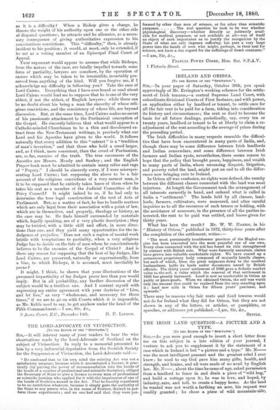IRELAND AND ORISSA.
[To THE EDITOR OF THE " SFECTATOR."J SIR,—In your paper of Saturday, October 30th, you speak approvingly of Mr. Errington's working schemes for the settle-
ment of Irish tenures,—a central Supreme Land Court, with subordinate divisional Courts of First Instance, and with power, on application either by landlord or tenant, to settle once for all the fair rent to be paid for a farm, taking into consideration its history and circumstances ; the rent so fixed to become the basis for all future dealings, periodically, say, every ten or twenty years, landlord or tenant to be at liberty to claim a re- adjustment of the rent according to the average of prices during the preceding period.
The Irish difficulties in many respects resemble the difficul- ties that have been encountered in many parts of India, and, though there may be some difference between Irish landlords and Indian zemeendars, and some difference between Irish farmers and Indian ryots, nevertheless, there seems reason to hope that the policy that brought peace, happiness, and wealth to many parts of India, where unceasing disquiet, litigation, and poverty ruled the land, might put an end to all the differ- ences now bringing ruin to Ireland.
In Orissa all was confusion, no rights were defined, the enmity between the different classes connected with the land was most injurious. At length the Government took the arrangement of all interests earnestly in hand, and ordered what is called in India a " settlement." The lands held by all classes, land- lords, farmers, cultivators, were measured, and after careful inquiries as to all the resources of each tenure or holding, with the assistance of assessors, in the presence of all the parties in- terested, the rent to be paid was settled, and leases given for thirty years.
What has been the result ? Mr. W. W. Hunter, in his " History of Orissa," published in 1872, thirty-four years after the completion of the settlement, writes :—
" The most persistently troublesome province of the Moghul em- pire has been converted into the most peaceful one of our own. Every class connected with the soil has found its title strengthened by contact with British rule. What were formerly uncertain claims have grown into valuable marketable rights. We have reared up a permanent proprietary body composed of mutually hostile classes, but each of which, from the great seigneurs down to the resident husbandmen, holds its lands under documents issued by British officials. The thirty years' settlement of 1836 gave a definite market value to the soil, a value which the renewal of that settlement in 1866 has greatly increased. Land is now as marketable in Orissa as paddy or piece-goods. When we obtained Orissa, the soil was worth only the amount that could be realised from the crop standing upon it ; land now sells in Orissa for fifteen years' purchase, and upwards."
There may be reasons why fair rents and fixed tenures would not do for Ireland what they did for Orissa, but they are not shown in any of the letters, or articles, or pamphlets, or- speeches, or addresses yet published.—Lam, Sir, &c., SETTLE.






































 Previous page
Previous page